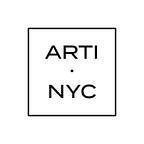As the pandemic turned out to be just a long vacation for many, London-based abstract artist Dean Rossiter experienced it in a rather dreadful way. Dealing with the disease among the close family and the galleries’ shutting, he still found the power to create yet the most compelling series called “Isolation Portraits.” We thought his example could empower artists and art lovers. Here is a brief interview with Dean Rossiter, an artist who took the pandemic under control.
ARTI.NYC: The series is called “Isolation Portraits.” Tell us about your experience with self-isolation in London. What made you start this series?
Dean Rossiter: I started this series as a way to internalize and make sense of this new paradigm. For me personally, my experience in isolation has been a mixture of heartbreak and jubilation, but overall it’s allowed me to reassess and see the bigger picture. I have always used art to communicate with the world, and this series is no different.
As social creatures, this isolation has put us in a situation that’s in complete contrast to who we are on a fundamental level. Because of this, I wanted to make artwork that brought people together in a shared experience and create a dialogue in a crisis time.
AN: It’s often hard for artists to find the right words for the titles. Your titles are phenomenal, and they add more sense to the artworks. How do you come up with them?
DR: I have always been interested in the power of visual and verbal language, and I’m also aware of their unique characteristics and individual limitations. I draw most of the language for my titles from various sources such as music, literature, and advertising.
I often hear or read things in passing, and it will stick with me all day. I enjoy combining these unrelated sources to create titles that have an immediacy yet retain some sense of mystery.
Just like the visual abstraction in my work, I want this verbal abstraction to take the work and its audience to a completely different place. I think a journey with a work of art is very important.
AN: What is the Isolation Portraits’ central message, and how is it different from your previous work?
DR: I don’t think there is a singular central message to this body of work. On one level, this work certainly engages with themes relating to social isolation while also weaving ideas relating to a loss of identity and the existential inquiry into the notion of the ‘self.’ I think this pandemic has forced us all to reassess not just ourselves but the world as a whole and fundamentally our purposes in this world.
On another level, this work uses abstraction as a form of escapism. I like the familiarity my source imagery has, but I also like how abstraction can disrupt this and offer us an alternative. Given what’s happening, I think it’s important to have the opportunity to escape and retreat into some sort of haven.
Where this work differs from my previous work is in its use of populist imagery. I am purposefully pulling visual material from a wide variety of everyday sources. I’m hoping this allows the work to resonate with almost everybody on some level and promote a greater sense of inclusivity in a time of crisis.
AN: Your advice for the artists to stay productive during the pandemic. How do you get inspiration if you are locked in?
DR: I feel very fortunate as I have always drawn inspiration from contemporary culture, whether music, advertising, T.V, social media, or literature. Because of this, the lockdown hasn’t really affected my ability to be inspired. If anything, it’s turned my production into overdrive.
My one piece of advice for any artist, whether we’re in lockdown or not, is never to compare yourself to others. It is such a dangerous trap that social media has created, and it can be incredibly detrimental both to an artist’s work and an artist as an individual.
AN: How do you think will the art world change? How does your new series respond to these changes?
DR: I think the art world needs to get use to the idea of a more digitally integrated future. I have to be honest, I don’t think you can beat the authentic experience of viewing art in person but the internet has a way of making art far more accessible and inclusive.
Limited edition prints available here.
More information and more works here.
At the start of this pandemic it felt natural for this series of original works to be available as limited edition prints. It’s important to me that my work remains accessible even in light of our current situation. I think in times of crisis art can be far more useful than something you hang on a wall.
